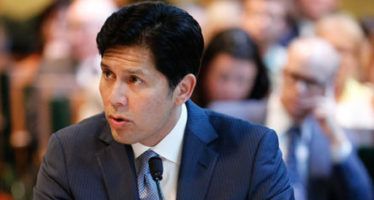Congress could nix California retirement program
 The House of Representatives voted to axe California’s planned retirement savings program, throwing the future of it and similar efforts around the country into serious doubt.
The House of Representatives voted to axe California’s planned retirement savings program, throwing the future of it and similar efforts around the country into serious doubt.
“Despite a plea from California Gov. Jerry Brown, the state’s GOP representatives voted unanimously [last week] on a resolution to block California and other states from setting up 401-K-type plans for private-sector workers who lack retirement benefits – a measure that sailed through the U.S. House of Representatives on a party-line vote,” the San Jose Mercury News reported.
Because the Labor Department enacted rules designed to enable those plans to be formed late in former President Obama’s last term, lawmakers are able to act to undo them. “The House passed the resolutions largely along party lines under a legislative mechanism known as the Congressional Review Act, which allows Congress to kill regulations rolled out during the final months of the previous administration,” as the Wall Street Journal explained.
California pleading
In a letter to the California congressional delegation, Gov. Brown had admitted the plan would direct money away from the financial services industry, but pled for the broader menu of retirement options he said it would provide. “Brown, who signed legislation last year establishing the ‘Secure Choice’ program, called the retirement savings opportunity modest, but important,” according to the Sacramento Bee. “He said the labor department issued its rule to ensure the retirement schemes were financially and legally sound. Efforts to wipe away the Obama administration regulations could spur legal challenges to state programs like the one in California, and imperil future moves to enact the benefit in other states.”
Secure Choice promised to offer “automatic payroll deductions for as many as 7 million low- and middle-income workers whose employers don’t offer 401-k plans or other benefits,” the Mercury news noted. “Illinois, Connecticut, Maryland and Oregon have passed similar initiatives.”
Risky choices
The party-line split on the controversy has sharpened a debate over the distribution of retirement costs fueled by challenges on both sides. Republican lawmakers oppose the prospect of even greater public pension problems nationwide, while Democrats argue that private-sector pensions no longer cover the needs of retired workers to the degree they did in a different economic era. “Studies show that employees are 15 times more likely to save for retirement if they have a plan at work. But roughly half of American workers, many of whom are employed by small businesses, don’t have access to one,” AARP noted in a review critical of the Republican position.
Some state governments, already troubled by the prospect of public pensions crises, have found themselves torn between risking a private sector retirement crisis on the one hand and a funding crisis for private sector employee pensions on the other. The posture of many state officials has suggested that struggling with the latter may seem to them to be the safer political bet. “Fifteen state treasurers, including Republicans in Indiana, Idaho, Utah and Louisiana, wrote Congress on Tuesday opposing the effort to roll back the Obama-era rule, which they said ‘provides important flexibility to states and large municipalities as they seek to address the growing retirement crisis facing this country,'” according to The Hill. “The National Conference of State Legislatures also urged Congress to keep the rule in place.”
At the same time, powerful private-sector interests have lined up an in-depth defense against supporters of the state pension plans, driven not only by self-interest but a concern that states’ track records on public pensions do not inspire confidence in their ability to successfully manage a broad new expansion of retiree benefit management into the private sector. “If Congress rolls back the rule, it would likely open retirement programs run by states to legal challenges,” The Hill added.
Related Articles
Bill would allow AWOL state employees to keep jobs
SACRAMENTO — Imagine you miss work for five consecutive days and don’t call your supervisor to explain why. You probably
California Democrats brace for intra-party battle after Kevin de León announces bid to unseat Feinstein
Amid intense calls from progressives for a primary opponent for U.S. Sen. Dianne Feinstein, D-Calif., state Senate Pro Tem Kevin
Is the Budget Kabuki Dance Ending?
MARCH 31, 2011 By KATY GRIMES The budget dance between the Republican legislators and Democratic Gov. Jerry Brown appears to




